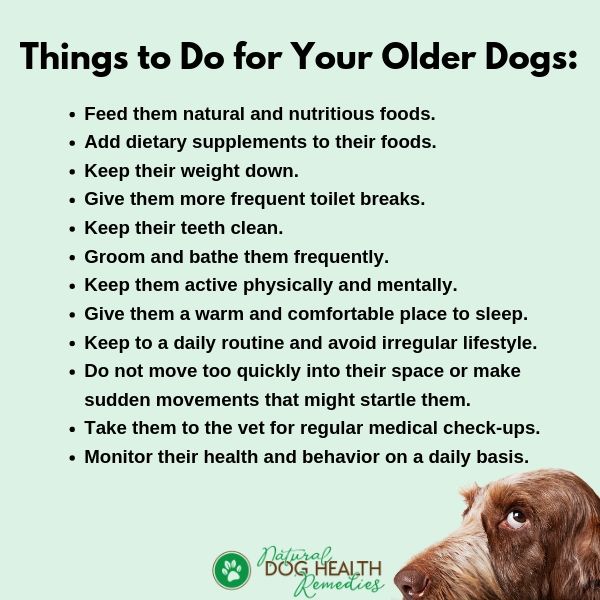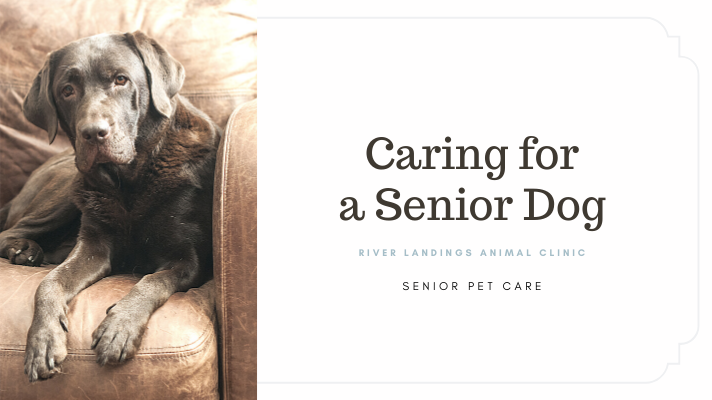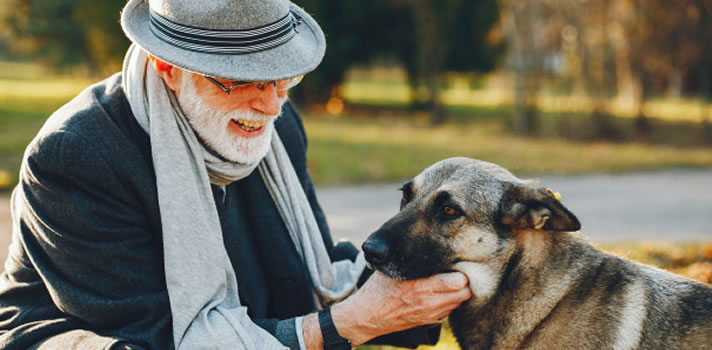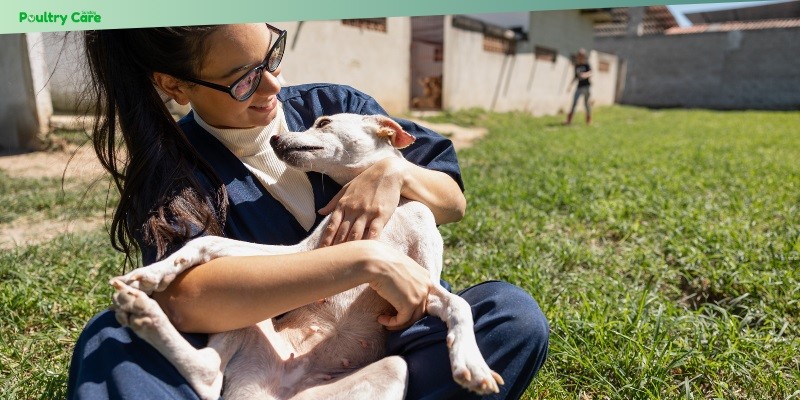Caring for a senior dog requires patience and attention. Their needs change as they age.
Older dogs may have health issues or need special care. Understanding these needs is crucial. Senior dogs often face joint pain, reduced energy, and dental problems. They might need a different diet. Regular vet visits become more important. As they grow older, they may require more rest and comfort.
Their love remains the same, but they might show it differently. It’s essential to adapt to these changes to keep them happy and healthy. This blog will guide you through the steps to ensure your senior dog enjoys their golden years. You’ll learn how to adjust their routine and provide the best care possible.

Credit: www.natural-dog-health-remedies.com
Nutrition Needs
Senior dogs need a diet rich in proteins, healthy fats, and essential vitamins. Balanced nutrition helps maintain energy levels and supports joint health. Fresh water is also vital for their hydration and overall well-being.
Caring for a senior dog involves more than just love and attention; their nutrition needs evolve as they age. Just like humans, older dogs require specific dietary adjustments to maintain their health and vitality. You might notice that your senior dog is less energetic or has different eating habits. It’s essential to adapt their diet to support their changing needs.
Balanced Diet
A balanced diet is crucial for your senior dog’s health. Older dogs often benefit from diets lower in calories to prevent obesity, a common issue in aging canines. However, they still need sufficient protein to maintain muscle mass.
Choose high-quality dog foods specifically formulated for senior dogs. These typically have the right balance of nutrients to support their aging bodies. Look for options that list meat as the first ingredient and avoid those with excessive fillers.
Consider your dog’s specific health conditions. If they have kidney issues, low-protein diets may be necessary. Always consult with your veterinarian to tailor the diet to your dog’s unique needs.
Supplements
Supplements can play a significant role in enhancing your senior dog’s diet. Older dogs may require joint supplements like glucosamine and chondroitin to ease arthritis symptoms. These can help maintain mobility and comfort.
Omega-3 fatty acids, commonly found in fish oil, support skin health and reduce inflammation. They can also boost cognitive function in senior dogs.
Before adding any supplements, discuss them with your vet. They’ll guide you on appropriate dosages and ensure they won’t interfere with any medications your dog may be taking.
As your furry friend enters their golden years, how do you ensure they’re getting the nutrition they need? Your efforts in tailoring their diet can significantly enhance their quality of life. Taking these steps not only supports their health but also strengthens the bond you share.

Credit: www.riverlandingsanimalclinic.com
Exercise And Mobility
Exercise is crucial for maintaining a senior dog’s mobility and well-being. As dogs age, their energy levels and physical capabilities change. Regular, appropriate exercise helps keep their muscles strong and joints flexible. It also supports mental health and overall happiness.
Gentle Activities
Senior dogs benefit from gentle activities that match their energy levels. Short walks are excellent for older dogs. They provide physical movement without overexertion. Swimming is another great option. It’s low-impact and easy on the joints. Consider indoor play with soft toys. It keeps their mind active and body moving. Always observe your dog’s response to activities. Adjust based on their comfort and stamina.
Joint Health
Joint health is key for maintaining mobility in senior dogs. Supplements like glucosamine support joint function. They can reduce discomfort and improve mobility. A balanced diet with anti-inflammatory foods helps too. Omega-3 fatty acids are beneficial for joint health. Regular vet check-ups ensure early detection of joint issues. Your vet can provide tailored advice and treatments. Maintaining a healthy weight also reduces joint stress. Excess weight can strain joints and lead to pain.
Regular Vet Visits
Caring for a senior dog requires regular vet visits. These visits are essential for maintaining their health and well-being. As dogs age, their needs change, and routine checkups help catch any potential issues early. Regular vet visits also ensure that your dog stays up-to-date with necessary vaccinations. Let’s delve deeper into the importance of health checkups and vaccinations for senior dogs.
Health Checkups
Regular health checkups are crucial for senior dogs. During these visits, the vet will examine your dog’s overall health. They check for signs of arthritis, dental issues, and other common age-related conditions. Early detection can make a big difference. It can lead to more effective treatments and a better quality of life for your pet.
The vet may also suggest blood tests. These tests can identify problems that are not visible during a physical exam. Regular blood work helps monitor the health of your senior dog over time. It allows the vet to spot any changes that could indicate health issues.
Vaccinations
Keeping up with vaccinations is important for senior dogs. Even older dogs need protection against diseases. The vet will review your dog’s vaccination history during regular visits. They will recommend any necessary boosters.
Some vaccinations are particularly important for senior dogs. For example, the rabies vaccine is essential. It protects not only your dog but also your family. Other vaccines help prevent illnesses that can be severe in older dogs. Staying on top of vaccinations helps ensure your senior dog’s health and safety.
Comfort And Safety
Provide a soft bed for your senior dog to ease joint pain. Keep their living area clean and safe.
As your dog gets older, their comfort and safety become top priorities. Senior dogs have unique needs and may require special attention to ensure they live their golden years happily and healthily. Providing a comfortable and safe environment can significantly improve their quality of life. Let’s explore practical ways to enhance your senior dog’s comfort and safety at home.
Comfortable Bedding
Your senior dog might struggle with joint pain or arthritis. Investing in orthopedic bedding can make a huge difference. These beds offer support and help alleviate pressure on their joints.
Look for beds with memory foam or egg-crate padding. These materials conform to your dog’s body and provide extra comfort.
Additionally, placing the bed in a quiet, draft-free area ensures your dog can rest without disturbances. Creating a cozy corner can give them a sense of security.
Home Modifications
Simple changes around the house can make life easier for your aging pet. Consider adding ramps to help them navigate stairs. This is especially important if your dog has mobility issues.
Non-slip rugs or mats can prevent falls on slippery floors. This is crucial for dogs who may have trouble maintaining balance.
Elevating food and water bowls can reduce strain on their neck and joints. You can use a sturdy stand or purchase specially designed elevated bowls.
Try rearranging furniture to create clear pathways. This helps your dog move around without obstacles, reducing the risk of injury.
By making these adjustments, you can ensure your senior dog feels comfortable and safe in their living space. How do you plan to enhance your senior dog’s comfort and safety at home? Share your thoughts and experiences with us!

Credit: wardscorneranimalhospital.com
Frequently Asked Questions
What Is The Leading Cause Of Death In Senior Dogs?
Cancer is the leading cause of death in senior dogs. It often affects older dogs due to age-related factors. Early detection and treatment can improve outcomes. Regular vet check-ups are crucial for senior dogs to monitor their health and catch potential issues early.
When Should A Dog Be Put Down For Old Age?
Consider euthanasia when a dog suffers from chronic pain, loss of mobility, or poor quality of life. Consult with a veterinarian to assess the dog’s condition and make a compassionate decision. Prioritize the dog’s comfort and dignity in their final days.
What’s The 90/10 Rule For Dogs?
The 90/10 rule for dogs means 90% of their diet should be balanced dog food, and 10% can be treats. This ensures proper nutrition and health.
Do Senior Dogs Like To Be Left Alone?
Senior dogs often prefer companionship. They can feel anxious or lonely when left alone for long periods. Regular interaction and attention are important for their well-being.
How Often Should I Walk My Senior Dog?
Walk your senior dog daily. Short, gentle walks are best. Monitor for signs of tiredness.
Conclusion
Caring for a senior dog requires patience and love. Regular vet visits are crucial. Offer a balanced diet and fresh water. Gentle exercise keeps them active. Comfortable bedding helps with joint pain. Show affection daily. Pay attention to changes in behavior.
Senior dogs can live happy lives with proper care. They deserve our best in their golden years. Enjoy the special moments together.
Last Updated on June 27, 2025 by Pauline G. Carter

